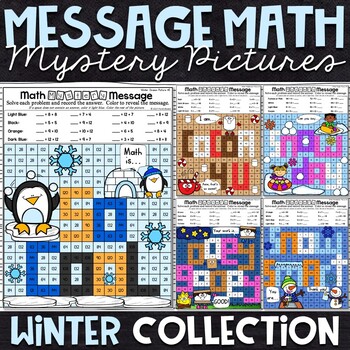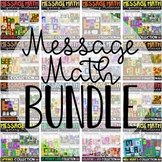Winter Multiplication and Division | Winter Color by Number
- Zip
What educators are saying
Also included in
- These multiplication and division mystery pictures will make practicing fact fluency lots of fun! The positive holiday and seasonal messages will encourage, motivate, and amuse students. Each page also features fun clip art that completes the picture. Students solve math problems and color by code.Price $30.00Original Price $47.50Save $17.50
Description
This set of winter mystery pictures will make practicing multiplication and division lots of fun! The positive winter-themed messages will encourage, motivate, and amuse students. Each page also features fun winter clip art that completes the picture. Students solve math problems and color by code.
This set of math mysteries reviews the following:
Multiplication Facts 0-5
Multiplication Facts 3-6
Multiplication Facts 7-12
Missing Quotient – Mixed Practice
Missing Dividend – Mixed Practice
These math mysteries are great for:
Math Centers
Early Finishers
Homework
Check out more seasonal and holiday Message Math activities:
Thanksgiving Message Math Mystery Pictures
Christmas Message Math Mystery Pictures
Valentine's Day Mystery Pictures
St. Patrick's Day Mystery Pictures
The following Common Core Standards are included:
3.NBT.3 - Multiply one-digit whole numbers by multiples of 10 in the range 10-90
3.OA.4 -Determine the unknown whole number in a multiplication or division equation relating three whole numbers.
4.OA.1 - Interpret a multiplication equation as a comparison
Licensing Terms:
By purchasing this product, you own a license for one teacher only for personal use in your classroom. Licenses are non-transferable and cannot be passed from one teacher to another. If the teacher who purchases this license leaves the classroom or changes schools, the license and materials leave with that teacher. No part of this resource is to be shared with colleagues or used by an entire team, grade level, school or district without purchasing the correct number of licenses. Using this file, in whole or in part, to create another product, either free or for purchase, is prohibited.
Copyright Information:
All material included in this resource belongs to Ford's Board LLC. Included with purchase is a license to use the material, however you do not own the material. You may not upload any portion of this resource to the internet in any format.






